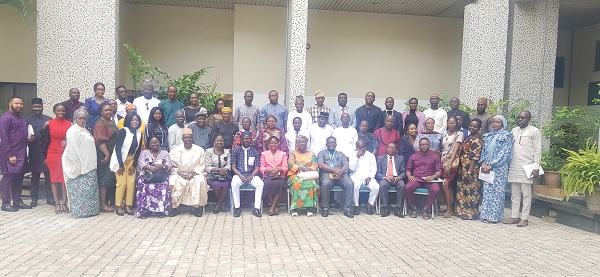
The acting director-general of the National Centre for Technology Management (NACETEM), Dr. John Omimakinde has identified skills acquisition and entrepreneurship intervention as one of the ways to tackle Nigeria’s unemployment crisis.
Omimakinde revealed this at the unveiling and public presentation of the impact of the design and impact of the National Youth Service Corps (NYSC) Skills Acquisition and Entrepreneurial Development (SAED) programme assessment report carried out the NACETEM in collaboration with the Centre for Gender and Social Policy Studies (CGSPS), Obafemi Awolowo University, Ile-Ife, Osun State and the NYSC, today (August 18, 2022) in Abuja.
Omimakinde, who pegged Nigeria’s current unemployment rate around 33 per cent, said the assessment is aimed at generating evidence to guide the workability of apprenticeship-based entrepreneurship, thereby boosting decent youth empowerment in the country and Africa at large.
In his remarks, the vice-chancellor, OAU, Ile-Ife, Prof. Adebayo Bamire said Nigeria can overcome her unemployment challenge by making entrepreneurship attractive and making capital available for youths.
Represented by the director of CGSPS, OAU, Dr. Olufumilayo Banjo, Bamire opined that encouraging youths with capital will spiral into massive engagement and, inevitably, economic development.
“I believe that we can overcome the unemployment challenge we have in Nigeria. From the presentation, the major issue that is not allowing these young people to go into entrepreneurial employment is the lack of capital. I believe if the government rises to the task and capital is made available to these young people, you will be surprised at what they will put on the table at the end of the day,” he said.
Listing some of the ways the SAED programme can be made more effective, the former director, NYSC SAED, Mr. Hilary Nasamu urged the government to consider investing in the skills’ development of youth corps members by posting them to places of primary assignment where their capacity can be built at a fee paid by the government.
“If the government can invest in the training of corp members by paying the trainers on behalf of the corp members we would have a very big party in this country where we would not only have corp members who are not only trained but backed financially by institutions like the Bank of Industry (BoI), they won’t be leaving this country.
“This idea of running abroad through the Sahara or the Mediterranean is basically because they have nothing to keep them here. They went to school without scholarships and graduated [and have] no jobs. What do you want them to do? The criminality and cyber crimes are a part of the bigger picture and if you [had] addressed this by investing in the NYSC SAED to train the over 3,000 graduates yearly, Nigeria will not be where she is today,” he opined.
Similarly, the assistant director, research, NACETEM, Dr. Abiodun Egbetokun called for funding of more research activities for institutions like NACETEM into loopholes and gaps in developing the skills of youths.
“One of the most critical challenges is that, as researchers looking at it from our perspective is funding. When everyone says ‘funding’ it tends to look as if we are transferring the burden to the government. At this point, we are not necessarily interested in government funding that much. It is about the private sector partnering with the government to make things work. For example, our research projects have been funded by foreign governments. One might want to ask why big businesses [do not do this]. Many of them are affected by the huge skills’ deficit in the country. A lot of the time they complain that the average Nigerian graduate is not employable unless they are re-trained after graduation. So, why not work with the government to support research that helps us to understand the skills’ deficit problem, to close this huge gap?”


